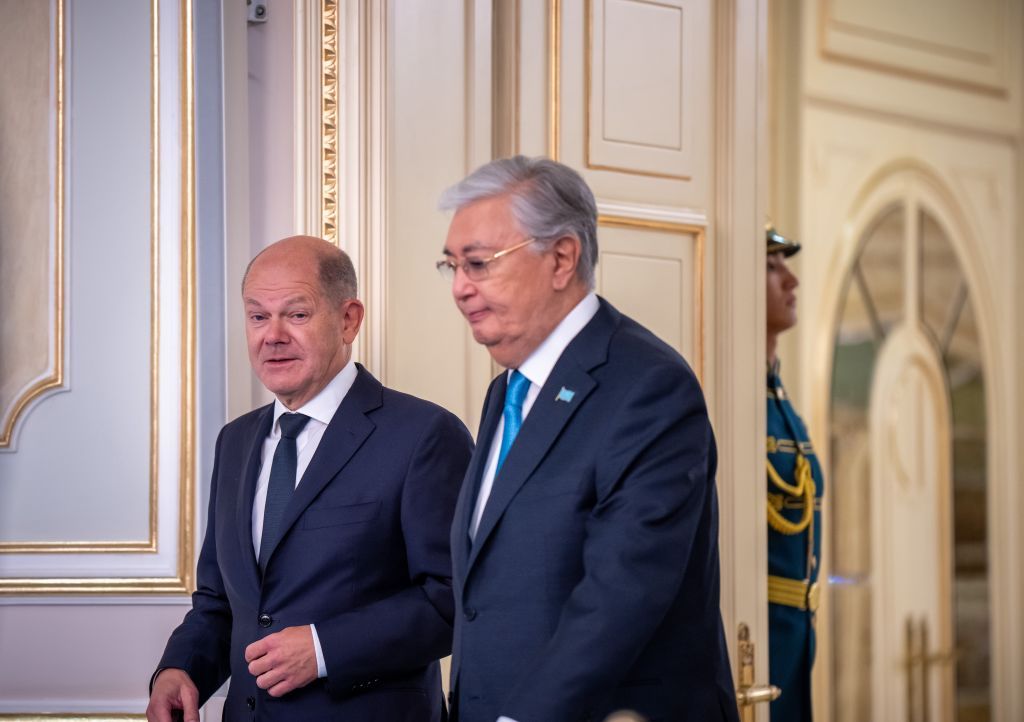President Tokayev of Kazakhstan emphasized the inability to defeat Russia militarily during a meeting with German Chancellor Scholz. Despite this, Kazakhstan has not recognized Russia’s illegal annexation of Ukrainian territories. The country has opted for a pragmatic approach, maintaining its relationship with Russia while expressing concern about the escalating conflict in Ukraine. Kazakhstan has also shown support for a Chinese-Brazilian peace plan and has been accused of aiding in sanctions evasion for Russia. Deputy Prime Minister Zhumangarin stated that Kazakhstan will not blindly follow sanctions that affect its domestic companies, seeking concessions from the West for trade with Iran or transit use, though unsuccessfully.
The geopolitical situation in Kazakhstan has become more complex as both Russia and the West vie for influence in the region. President Putin’s visit to Kazakhstan in November was seen as a routine affair, but underlying tensions between Russia and the West were evident. Kazakhstan’s President Tokayev played a balancing act by welcoming Putin while also promising to adhere to sanctions imposed on Russia. The country’s strategic importance as a transit point has put it in the middle of the conflict, with accusations of aiding Russia in evading sanctions. Kazakhstan’s stance on unilateral sanctions and its continued economic cooperation with Russia reflect its efforts to maintain its own interests amid external pressures.
The situation in Kazakhstan highlights the challenges faced by countries caught between major powers like Russia and the West. President Tokayev’s cautious approach to the conflict in Ukraine and his refusal to fully align with Russia demonstrate the delicate diplomatic balancing act required in such circumstances. Kazakhstan’s support for a Chinese-Brazilian peace plan, rejected by Germany, further underscores its attempt to navigate complex international dynamics. Despite accusations of facilitating sanctions evasion for Russia, Kazakhstan has also sought concessions from the West to protect its own economic interests, showing a desire to maintain sovereignty amid external pressures.
Kazakhstan’s strategic importance as a transit hub and its role in regional geopolitics have made it a key player in the Russia-Ukraine conflict. President Tokayev’s statements regarding the impossibility of defeating Russia militarily and his support for a peace plan indicate a nuanced approach to the situation. Kazakhstan’s refusal to fully align with either side, while continuing economic cooperation with Russia, reflects a desire to protect its own interests while avoiding becoming ensnared in the conflict. The country’s position as a potential intermediary for sanctions evasion has drawn attention, with Deputy Prime Minister Zhumangarin’s statements on not blindly following sanctions showcasing Kazakhstan’s efforts to maintain its economic stability.
Overall, Kazakhstan’s stance in the current geopolitical climate underscores the challenges faced by countries navigating the tensions between major powers. President Tokayev’s pragmatic approach, balancing between Russia and the West, highlights the complexity of the situation in Kazakhstan. The country’s importance as a transit point and its role in regional politics have made it a key player in the ongoing conflict between Russia and Ukraine. Kazakhstan’s efforts to protect its own interests while navigating external pressures demonstrate the intricate diplomacy required to maintain sovereignty and stability in a volatile international environment.


